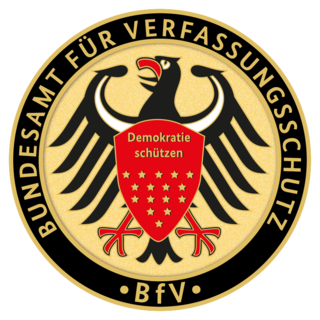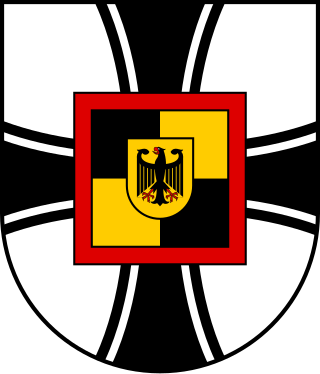
The Federal Office for the Protection of the Constitution is Germany's federal domestic intelligence agency. Together with the Landesämter für Verfassungsschutz (LfV) at the state level, the federal agency is tasked with intelligence-gathering on efforts against the liberal democratic basic order, the existence and security of the federation or one of its states, and the peaceful coexistence of peoples; with counter-intelligence; and with protective security and counter-sabotage. The BfV reports to the Federal Ministry of the Interior and tasks and powers are regulated in the Bundesverfassungsschutzgesetz. The President is Thomas Haldenwang; he was appointed in 2018.

The Federal Ministry of Finance, abbreviated BMF, is the cabinet-level finance ministry of Germany, with its seat at the Detlev-Rohwedder-Haus in Berlin and a secondary office in Bonn. The current Federal Minister of Finance is Christian Lindner (FDP).

The Federal Ministry of Defence, abbreviated BMVg, is a top-level federal agency, headed by the Federal Minister of Defence as a member of the Cabinet of Germany. The ministry is headquartered at the Hardthöhe district in Bonn and has a second office in the Bendlerblock building in Berlin, which is occasionally used colloquially to denote the entire Ministry.
The Australian Intelligence Community (AIC) and the National Intelligence Community (NIC) or National Security Community of the Australian Government are the collectives of statutory intelligence agencies, policy departments, and other government agencies concerned with protecting and advancing the national security and national interests of the Commonwealth of Australia. The intelligence and security agencies of the Australian Government have evolved since the Second World War and the Cold War and saw transformation and expansion during the Global War on Terrorism with military deployments in Afghanistan, Iraq and against ISIS in Syria. Key international and national security issues for the Australian Intelligence Community include terrorism and violent extremism, cybersecurity, transnational crime, the rise of China, and Pacific regional security.

The Federal Criminal Police Office of Germany is the federal investigative police agency of Germany, directly subordinated to the Federal Ministry of the Interior. It is headquartered in Wiesbaden, Hesse, and maintains major branch offices in Berlin and Meckenheim near Bonn. It has been headed by Holger Münch since December 2014.

The Federal Office for Information Security is the German upper-level federal agency in charge of managing computer and communication security for the German government. Its areas of expertise and responsibility include the security of computer applications, critical infrastructure protection, Internet security, cryptography, counter eavesdropping, certification of security products and the accreditation of security test laboratories. It is located in Bonn and as of 2024 has about 1,700 employees. Its current president, since 1 July 2023, is former business executive Claudia Plattner, who took over the presidency from Arne Schönbohm.

Law enforcement in Germany is constitutionally vested solely with the states, which is one of the main features of the German political system.
The Military Counterintelligence Service is one of the three federal intelligence agencies in Germany, and is responsible for military counterintelligence within Bundeswehr. The MAD is subordinate to the Federal Ministry of Defense.

The Joint Support Service is a branch of the German Bundeswehr established in October 2000 as a result of major reforms of the Bundeswehr. It handles various logistic and organisational tasks of the Bundeswehr. The SKB is one of six components of the Bundeswehr, the other five being the Army, Navy, Air Force, the Joint Medical Service, and the Cyber and Information Domain Service. As of April 2020, the force is composed of 27,840 personnel. In May 2021 the minister of defense Annegret Kramp-Karrenbauer together with inspector general Eberhard Zorn published a plan to dissolve the Joint Support Service and to reintegrate its units into the army, navy, airforce and cyber command.

University of the Bundeswehr Munich is one of two research universities in Germany at federal level that both were founded in 1973 as part of the German Armed Forces (Bundeswehr). Originally called Hochschule der Bundeswehr München the institution was supposed to offer civilian academic education for military officers. As an uncommon feature amongst German universities University of the Bundeswehr Munich unifies a more theoretical research university division and a more practical-oriented College of Applied Sciences branch. Today, the university has an increasing number of civilian and international students. The academic year at the university is structured in "trimesters" and not the usual semester, to offer intensive studies with more credit points per year. Very capable students can therefore achieve a bachelor's and a master's degree within less than four years, while this would usually require five years. University of the Bundeswehr Munich has well-established scientific research and forms part of two excellence clusters of the German government's university excellence initiative. The University of the Bundeswehr Munich is one of only very few campus universities in Germany.
The counter-terrorism page primarily deals with special police or military organizations that carry out arrest or direct combat with terrorists. This page deals with the other aspects of counter-terrorism:

Jörg Schönbohm was a German politician (CDU) and a retired lieutenant general. He was the first commander of the so called Bundeswehr Kommando OstFedaeral Armed Forces Command East, which supervised the absorption of the East German National People's Army into the Federal German armed forces (:de:Bundeswehr) as part of the Army of Unity. In 1991 he became the Inspector of the Army, the highest-ranking officer in the German Army; he was retired in 1992 to become Undersecretary for Security Policy in the Federal Ministry of Defence. From 1996 to 1998 Schönbohm was Senator of the Interior for the city of Berlin, and from 1999 to 2009 he held the same office as interior minister for the state of Brandenburg.
The United Kingdom has a diverse cyber security community, interconnected in a complex network.

The Armed Forces Staff, in the meaning of General staff, of the German Bundeswehr was the central department of the Federal Ministry of Defence (MOD) in direct subordination to the Inspector General of the Bundeswehr and one of the five staff headquarters in the military command of the German Bundeswehr.

The Cyber and Information Domain Service is the youngest branch of Germany's military, the Bundeswehr. The decision to form a new military branch was presented by Defense Minister Ursula von der Leyen on 26 April 2016, becoming operational on 1 April 2017. The headquarter of the Cyber and Information Domain Service is Bonn.
The Department of Home Affairs is the Australian Government interior ministry with responsibilities for national security, law enforcement, emergency management, border control, immigration, refugees, citizenship, transport security and multicultural affairs. The portfolio also includes federal agencies such as the Australian Border Force and the Australian Security Intelligence Organisation. The Home Affairs portfolio reports to the Minister for Home Affairs, currently held by Clare O'Neil, and was led by the Secretary of the Department of Home Affairs, Mike Pezzullo, until his sacking in November 2023 for breaching the code of conduct. In 2022, the Australian Federal Police, Australian Criminal Intelligence Commission and Australian Transaction and Analysis Center were de-merged from the department and moved to the Attorney General portfolio.
The German Intelligence Community is the collective of intelligence agencies in Germany. Germany has three federal intelligence services and 16 state intelligence services. Because they do not form a single entity and because their responsibilities are split between multiple government ministries and even jurisdictions, this is an informal term for all government agencies and components with intelligence duties, used by commentators, scholars and journalists.

The Strategic Reconnaissance Command is the central headquarters for military intelligence of the German Bundeswehr, based in Gelsdorf.












